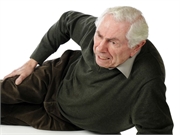
MONDAY, Sept. 21, 2020 (HealthDay News) -- In older people a fall can sometimes be a sign of oncoming Alzheimer's disease, even in the absence of mental issues, new research suggests.
Although falls are common among older people, in some cases they can be a sign of hidden mental problems that can lead to dementia, according to researchers at Washington University School of Medicine in St. Louis.
Older people who have had falls should be screened for Alzheimer's, the study authors said.
"In the world of fall research, we generally say that you're at risk of falling if you lose strength and balance," said co-senior author Susan Stark. She's an associate professor of occupational therapy, neurology and social work.
"If you lose strength and balance, the recommended treatment is to work on strength and balance. But if someone is falling for another reason, maybe because his or her brain has begun accumulating Alzheimer's-related damage, that person might need a different treatment entirely," she explained in a university news release.
Stark said it's not yet clear what that treatment might be, but researchers hope the information will lead to new recommendations to reduce the risk of falls.
For the study, the researchers followed 83 people over age 65 for one year. All participants had normal thinking and memory at the outset, and kept monthly calendars recording any falls. Each person had brain scans to look for amyloid plaque (which has been tied to Alzheimer's) and signs of brain shrinkage.
The researchers found that amyloid in the brain alone did not put people at increased risk of falling, but neurodegeneration (brain shrinkage) did.
Participants who fell had smaller hippocampi brain regions devoted to memory. Those regions shrink in Alzheimer's. Brain networks involved in receiving sensory inputs and controlling movement also showed signs of decay, the findings showed.
Co-senior author Dr. Beau Ances, a professor of neurology and radiology and biomedical engineering, said, "Since I started working on this project, I've started asking my patients about falls, and I can't tell you how often that has helped me start understanding what is going on with the individual."
When mobility is being diminished, it could be a sign that something needs a closer look, Ances said.
Stark said a lot of falls can be prevented by simple changes in the environment. They include making sure the tub or shower isn't slippery; making sure a senior can get up easily off the toilet; balance and strength training; and reviewing prescriptions to see if any increase the risk of falling.
"Until we have specific fall-prevention treatments for people with preclinical Alzheimer's, there are still plenty of things we can do to make people safer," she said.
The report was published online Sept. 14 in the Journal of Alzheimer's Disease.
More information
For more on Alzheimer's disease, head to the Alzheimer's Association.
Back

The news stories provided in Health News and our Health-E News Newsletter are a service of the nationally syndicated HealthDay® news and information company. Stories refer to national trends and breaking health news, and are not necessarily indicative of or always supported by our facility and providers. This information is provided for informational and educational purposes only, and is not intended to be a substitute for medical advice, diagnosis, or treatment.






